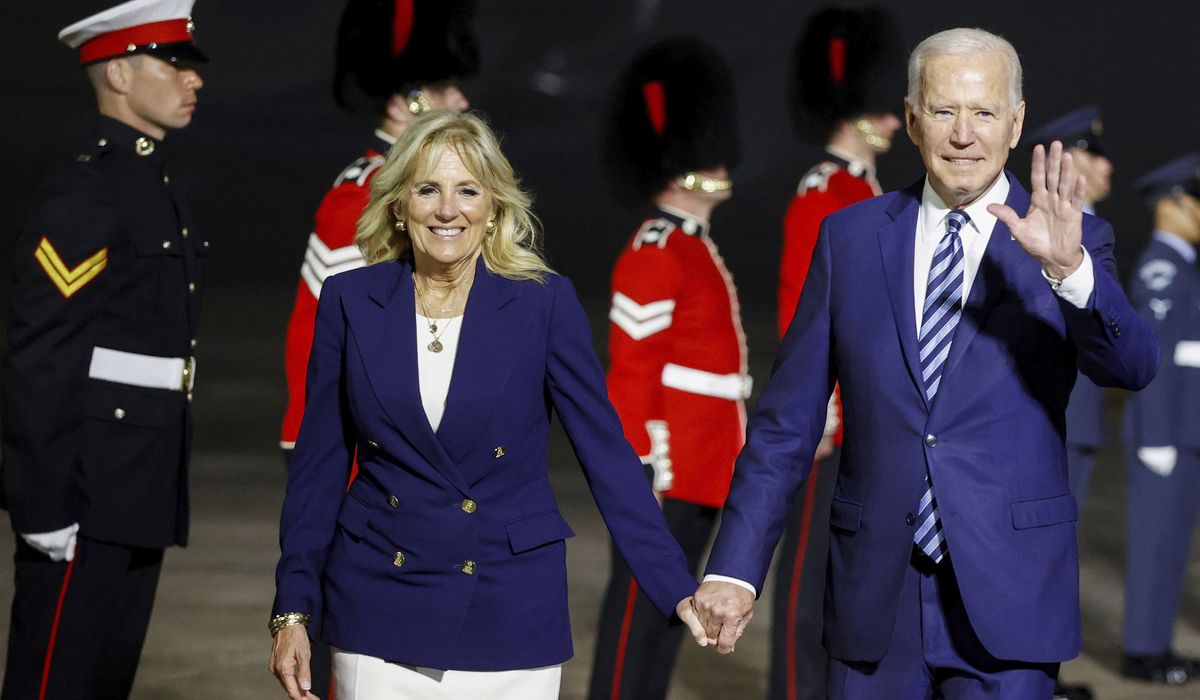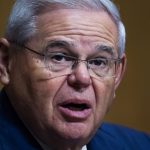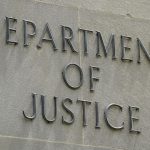
President Biden arrived in England on Wednesday for his first foreign trip, telling U.S. troops at an air base that he’s on a mission to reinforce alliances with the world’s leading democracies before his showdown next week with Russian President Vladimir Putin.
Mr. Biden said his talks with allies in the meeting of the Group of Seven leading industrial nations, NATO and the European Union are important preludes to his summit next week in Geneva with Mr. Putin “to let him know what I want him to know.”
The line drew a loud cheer from the troops.
“Our alliances weren’t built by coercion or maintained by threats,” Mr. Biden said. “They’re grounded on democratic ideals … where the rights of all people are protected. No nation can defeat us as long as we stick to our values.”
Mr. Biden and first lady Jill Biden arrived at Royal Air Force Mildenhall, the only permanent American refueling wing in Europe, as the first stop on their weeklong trip. As Mr. Biden took the stage and started his speech, he quickly interrupted himself.
“Please, at ease,” he told the troops. “I keep forgetting I’m president.”
Mr. Biden is seeking to revamp trans-Atlantic ties, forge a vaccine strategy against the COVID-19 pandemic and unite the world’s most economically advanced democracies to fight Russian and Chinese geopolitical provocations and a rising menace in cyberspace.
Administration officials will push the unity theme repeatedly during the high-level meetings, starting with the three-day G-7 summit in England, followed by a gathering of NATO allies and a one-day meeting with Mr. Putin on Wednesday.
The president noted that he was making his first overseas trip as the U.S. and other nations were working to contain COVID-19 outbreaks. Although Mr. Biden spoke outdoors, his audience wore masks, as did the president and first lady when they weren’t speaking at the podium.
The United Kingdom reported 7,540 new coronavirus cases Tuesday, the highest daily number since February.
The G-7 agenda is slated to feature discussions on ways to spur vaccination for COVID-19 in developing countries and the sensitive issue of a coordinated plan to tax multinational corporations at a minimum rate of 15%.
Mr. Biden told reporters as he left Washington on Wednesday that he plans during the coming days to announce a vaccine strategy for the world.
White House officials were reluctant to get ahead of the president, but a source familiar with the plan said the administration will buy 500 million doses to donate to the rest of the world — 200 million doses this year and 300 million doses in the first half of 2022.
“By announcing it ahead of the G-7 summit, it hopefully raises the bar for other G-7 members and [the European Union] to also step up,” said Krishna Udayakumar, the founding director of the Duke Global Health Innovation Center.
He said fellow experts project that the G-7 nations and European Union will have enough supply to donate at least 1 billion doses by the end of this year, potentially up to 2 billion, while still meeting domestic needs.
“Hopefully, this 500 million is the ‘ante’ from which the pot will grow substantially,” Dr. Udayakumar told The Washington Times.
The president also has backed a plan to ease vaccine patent protections to speed the production of the shots, but many Europeans are cool to the idea. They have offered a counterproposal before the World Trade Organization that would safeguard drugmakers’ intellectual property.
Mr. Biden’s meetings with allies are scheduled to consume all but one day of the trip, but his summit with Mr. Putin looms large on his agenda.
“Only after these meetings with our closest democratic partners to develop a common agenda and renewed purpose, I’ll be traveling to Geneva to sit down with a man I’ve spent time with before, Vladimir Putin,” Mr. Biden said. “We’re not seeking conflict with Russia … [but] want a stable, predictable relationship.”
He vowed, “I’m going to make clear that the trans-Atlantic alliance will remain a vital source of strength for the U.K., Europe and the United States … and make sure there’s no doubt as to whether the United States will rise in defense of our most deeply held values and our fundamental interests.
“We have to discredit those who believe that the age of democracy is over, as some of our fellow nations believe,” Mr. Biden said. “We have to expose as false the narrative that decrees of dictators can match the speed and scale of the 21st [century] challenges.”
Among the topics sure to be raised at the summit with Mr. Putin are a rising number of ransomware attacks believed to originate from Russia and Moscow’s continued aggression toward Ukraine.
“At every point along the way, we’re going to make it clear that the United States is back and the democracies of the world are standing together to tackle the toughest challenges and the issues that matter most to our future,” Mr. Biden said. “These nations that have shed blood alongside us in defense of our shared values, they’ve made the world safer for all of us. This is how we’re going to meet the challenges of today, which are changing rapidly. We’re going to meet it from a position of strength.”
The G-7 summit will be the first since 2019 among the U.S., U.K., France, Germany, Italy, Canada and Japan. Mr. Biden has made no secret of his desire to seize on the summit to send a clear message of togetherness and revive a forum that suffered badly in influence under President Trump.
Mr. Biden has said he wants to restore alliances and multilateralism in a sharp break from his predecessor. Mr. Trump preferred bilateral dealmaking, questioned the value of the EU and NATO, sparked trade wars and often criticized NATO partners as free riders who didn’t pay enough for defense compared with the U.S.
Trans-Atlantic analysts say the G-7 summit could be consequential. The group, which had been the Group of Eight, has held head-of-state gatherings only a handful of times since 2014, when Russia was purged after annexing the Crimean Peninsula from Ukraine.
The G-7 was formed in the 1970s to give industrial democracies a stabilizing influence over the global economy during oil and energy crises. More recently, it has been held up as a vehicle for free market unity in the face of rising Chinese economic power.
“This could be the most consequential G-7 summit since the aftermath of Sept. 11th,” Matthew P. Goodman with the Center for Strategic and International Studies, said about the manner in which the group, which had Russia as a member at the time, came together behind the George W. Bush administration’s global war on terror.
The public agenda this weekend includes combating climate change and spurring investment in technology-based industrial growth. But Mr. Goodman told a conference call this week that he expects “lots of private conversations, and those will be dominated by China and Russia.”
G-7 leaders are hoping to develop global investment subsidies and vehicles capable of countering the billions of dollars China is pumping into its Belt and Road Initiative to finance infrastructure projects in countries across Asia, Africa, Eastern Europe and Latin America.
In private, G-7 members are likely to talk about issues “like subsidies and response to the Belt and Road Initiative, corruption [and] other values-related issues,” said Mr. Goodman. He predicted “pretty pointed discussions about shared concerns about maritime security [and] about Taiwan.”
China has ramped up its military aggression in the South China Sea and the Taiwan Strait in recent years, increasingly menacing the tiny island democracy aligned with the United States and others in the G-7.
Administration officials have suggested that talks during the trip will focus just as heavily on Russia. Mr. Biden is slated to pursue an “action plan” at the G-7 summit to deal with increasing ransomware cyberattacks on U.S. government agencies and companies.
U.S. intelligence sources say the Kremlin has supported such attacks. The issue is getting fresh attention after criminal organizations tied to Russia struck the Colonial Pipeline, a critical fuel artery, and JBS Foods, a major meat processing company.
Hackers also have hit transportation systems in the Northeast and the Irish health service. National Security Adviser Jake Sullivan said ahead of Mr. Biden‘s departure for Europe that Western allies must develop norms for repelling hacks and responding to countries that harbor rogue actors.
In comments Monday, Mr. Sullivan said cryptocurrency “lies at the core” of how ransomware transactions play out, so that will be a key issue among the G-7. “We will also speak in the NATO context about cyberthreats, particularly as they relate to critical infrastructure, of being a different order of magnitude,” the national security adviser said of a meeting Monday with treaty partners in Brussels.
“It’s got to become a priority,” Mr. Sullivan said. “We will treat it as such in the G-7. We will treat it as such in every stop of the way on this trip.”
After the meeting with troops and their families, the Bidens flew to the seaside village of St. Ives in Cornwall, where the president will participate in the G-7 summit through Sunday.
One highlight of the trip for the president: a meeting with Queen Elizabeth on Sunday as Buckingham Palace prepares for national celebrations next year of the monarch’s 70th year on the throne.







